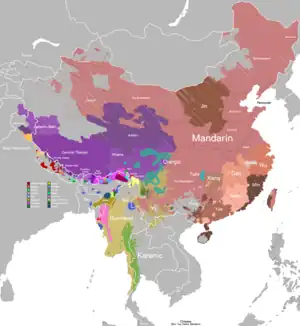Samei language
Samei (autonym: sa21 ni53) is a Loloish language of Yunnan, China closely related to Sani.[2] It is spoken in 47 villages in and around Ala Township 阿拉彝族乡, located in eastern Guandu District[3] just southeast of downtown Kunming, as well as in 7 villages in western Yiliang County (Ethnologue). There are about 20,000 speakers out of an estimated 28,000 ethnic population.
| Samei | |
|---|---|
| Native to | China |
| Ethnicity | Yi |
Native speakers | 20,000 (2007)[1] |
Sino-Tibetan
| |
| Language codes | |
| ISO 639-3 | smh |
| Glottolog | same1240 |
| ELP | Samei |
Documentation
Ye (2020) contains a detailed description and 3,000-word list of Samei.[3]
Samei lexical data is also documented in Satterthwaite-Phillips (2011).[4]
References
- Samei at Ethnologue (18th ed., 2015) (subscription required)
- Bradley, David (2005). "Sanie and language loss in China". International Journal of the Sociology of Language. 2005 (173): 159–176. doi:10.1515/ijsl.2005.2005.173.159.
- Ye, Kangjie 叶康杰 (2020). Samei Yiyu diaocha yanjiu 撒梅彝语调查研究. Kunming: Yunnan Ethnic Publishing House 云南民族出版社. ISBN 978-7-5367-8338-6.
- Satterthwaite-Phillips, Damian. 2011. Phylogenetic inference of the Tibeto-Burman languages or On the usefulness of lexicostatistics (and "Megalo"-comparison) for the subgrouping of Tibeto-Burman. Ph.D. dissertation, Stanford University.
This article is issued from Wikipedia. The text is licensed under Creative Commons - Attribution - Sharealike. Additional terms may apply for the media files.
